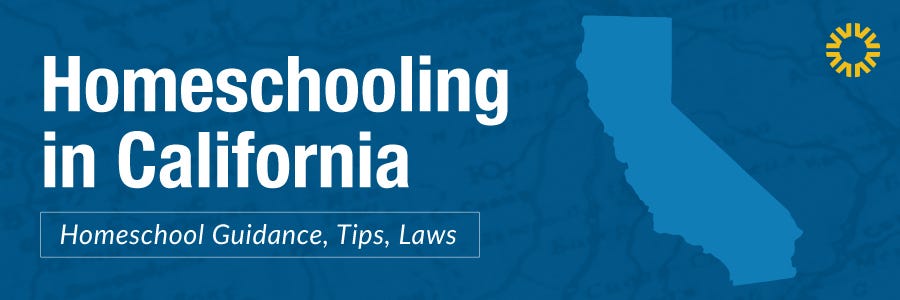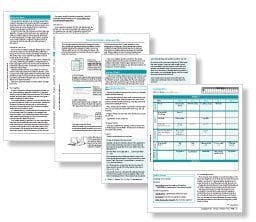Homeschooling in California: Guidance for Getting Started
Across all 50 states of America, homeschooling is legal. But when it comes to the details of this educational choice—how easy or hard it is, how to get started, what paperwork to file, the requirements, the costs, etc.—the details vary greatly from state to state.

DISCLAIMER: This article is not written as legal advice. Check with your local school board and official California state laws before making decisions about educating your children.
Homeschooling is regulated in California, but as per Homeschool Legal Defense Association, California is a low regulation state. For most families, low regulation means greater ease in homeschooling. This guide was written to help you scope out those key details for homeschooling in California, a state where homeschooling is both easy and popular!

The K Family, Sonlighters from Los Angeles, CA
Requirements for homeschooling in California
Families operating as a home-based private school do not have to adhere to specific days/hours of work, but they are required to keep records of attendance. They can determine their school year and the length of the school day.
Nor is there any fingerprinting or criminal background check required for parents who are seeking to homeschool their own children.
October 1–15 is the period when a parent can file a private school affidavit to establish a home-based private school. This filing includes basic records about your private school: the instructors, the students, grades taught, the name of the school, etc.
Although you will be required to list one Administrator, one Director, and one Custodian of Records, all three roles can be fulfilled by a single person—you!
If you miss the October filing date and choose to homeschool later, you can still file the affidavit.
If not filing as a home-based private school (independent homeschooler), then you’ll want to enroll your child in a charter school or a Private School Satellite Program (PSP), AKA umbrella school.
Most unschoolers actually do purchase curriculum; they simply use it in a looser or student-led way than the publisher wrote it.
• using a credentialed tutor
• establishing a home-based private school
• operating under a PSP
• enrolling in a charter school
Then you’ll want to make your choice official by enrolling or filing an affidavit.
If you’re going the PSP or charter school route, those groups will guide you in everything you’ll need from records to attendance.
But if you’re establishing a home-based private school as an independent homeschool, you’ll be responsible for nearly everything related to your homeschool: all decisions and all resources.
Here’s a basic list of needs any California homeschooler should consider:
• a solid curriculum that your kids love and is easy for you to teach
• basic school and office supplies
• time set aside regularly to learn together
• a place to store supplies and do schoolwork
• a sense of vision to give you motivation
• avenues for socialization and extracurriculars
Fortunately in California the options for extras are abundant! Brittney W., a Sonlighter in Los Angeles, shares:
“Since there is such generous homeschool funding, there are tons of enrichment options. There is waterfront education, the local YMCA even takes funds, and there are several enrichment centers.”
Homeschooling Options in California
Homeschooling Through a Home-based Private School
Note: No state funding is provided for curriculum or enrichment when homeschooling this way.
Grades 1–6:
- English
- Math
- Science
- Social Sciences
- Fine Arts
- Health and P.E.
- Foreign Language
- Applied Arts
- Vocational Education
- Driver’s Education
- Attendance Records
- Course of Study
- Faculty Qualifications
- Immunization Records or Waivers
- Health Exam Form or Waiver for First Grade Entry

The W. family, Sonlighters from Visalia, CA
Is homeschooling popular in California?
Absolutely! Homeschooling stats bear out its popularity in California. This state has one of the highest percentages of homeschooled children at 8.6%. To put that into context, the National Center for Education Statistics reported (in 2016) that 3.3% of American children were homeschooled. So California is over double the national average!
Is it easy to homeschool in California?
According to these two Sonlight moms, yes, it’s easy to homeschool in the Golden State!

The G Family, Sonlighters from Winters, CA
What are the homeschool requirements in California?
Don’t let the legalese intimidate you. California is a very homeschool-friendly state, and the requirements are quite doable.
So, how does homeschooling work in California?
If you want to educate your child outside of a public school, you have several choices. Most homeschool families opt for either enrolling in a public charter school (which provides funds for resources and some oversight) or operate an at-home private school by filing an affidavit online with the state. This second choice—at-home private school—is often called an “independent homeschooling” in contrast to the charter school homeschoolers who have to fulfill the expectations of their chosen charter.
Your choice depends on your comfort level with outside input. For some parents, the feedback and structure of a charter school is a welcome form of support. For other parents, a charter school’s input feels like an intrusion.
Of course, the funds that come along with a charter school enrollment are very attractive for many families and help them accept any whatever concessions they have to make to the charter school.
If you enroll under a charter school, your particular school will outline exactly what they expect from you.
Yay! This means you can do what you want in terms of curriculum. With this freedom though, comes an infinite scope of choices!
Two places to start when determining your California homeschooling program:
1. Start with state content standards — Although you’re not held to them, the state content standards offer reasonable benchmarks for planning your own program or choosing one to purchase.
2. Then look at popular homeschool curriculum packages — While you can piecemeal subjects from different vendors and publishers, an all-on-one curriculum streamlines your process and erases much of the decision fatigue.
If you go the home-based private school route, you will be asked to keep a Course of Study in your records. This can be a simple outline of what you plan to cover for the school year. If you purchase a comprehensive program like a Sonlight All-Subjects Package, you can use the scope and sequence as your Course of Study.
As a home-based private school, you are expected to cover the same subjects covered in public school: English, math, social sciences, science, fine arts, health, and P.E. And in grades 7–12, also foreign language, applied arts, vocational education, and driver’s education.
As you evaluate homeschooling programs in California, you may consider online homeschooling. While digital resources provide value, there’s no substitute for real books. Learn the incredible advantages of Sonlight’s literature-based approach.
If you go the charter school route, there will be teachers on hand to help you choose your homeschooling program and direct you to the vendor area of their website for ordering.
But homeschoolers do not have to take standardized tests if they are:
• using a private, credentialed tutor
• schooling under an umbrella school (Private School Satellite Program or PSP)
• operating as a home-based private school
For more, visit the California Dept. of Education.

The M Family, Sonlighters from Murrieta, CA
Getting Starting & Timing
The benefits of homeschooling in California are many. You get greater control over what, when, and how your children learn (or full control, depending on what type of homeschooling you choose). Your child can receive a completely customized education, perfectly tailored to their specific weaknesses, strengths, and interests.
Homeschooled kids are more likely to enjoy learning because their parents can allow for enjoyable rabbit trails and hands-on projects. Imagine letting your child choose the science topic for the semester or taking time to explore a museum for hours without a nagging reminder that it’s time to get on the bus.
There is truly no comparison between the attention a loving parent can provide a child and that of a harried classroom teacher trying to meet the varied needs of 30 students.
If your child is currently enrolled in a public school, notify the school that you are withdrawing your child. This should be done in writing (keep a copy). Your child’s school may have its own official form for you to use.
You can read detailed directions for this process here.
Can you skip kindergarten in California?
Since kindergarten typically happens at age 5 and compulsory school doesn’t start until age 6 in California, you can skip kindergarten in this state and begin formal schooling at age 6 with first grade.
However, many families love having the structure of a pre-planned kindergarten curriculum to guide their five-year-old’s day. For example, Sonlight History / Bible / Literature K for ages 5-7 is a delightful program that centers on American history. It’s gentle, engaging, and age-appropriate. So while you can skip kindergarten, why not enjoy this school year by reading great books with your five-year-old?
If you opt to homeschool kindergarten at home, there is no need to file an affidavit or join with a charter school.
California Field Trips for Homeschoolers
Field trips are so much more than a Plan B for a day when no one wants to do book work (although this is a perk, too!). Homeschool field trips provide invaluable real-world applications of what kids are learning about in their lessons. These excursions extend the learning and provide a facet of sensory immersion that books—as amazing as they are—can’t achieve.
California has the most state parks and national parks of any other state! So your options for nature-based exploration are plentiful.
We asked Sonlight moms to tell us about field trips in California:

The N. family, Sonlighters from Fresno, CA
Financial Considerations for Homeschooling in California
Any large venture prompts the question of cost. And it’s essential to weigh the expenses before you set out so you are prepared for the homeschool lifestyle.
Among the states, California ranks 50th for cost of living and 49th for housing affordability. Ouch! If you live there, you already know what an expensive state it is. So anything is going to be more costly there.
There you’ll see that the annual expense to homeschool one child ranges from $500 to $2500 per school year.
The largest single purchase for most families is curriculum, so look for a program that aligns with your goals and is worth the investment. When evaluating a program, consider:
• Can it be reused with multiple children?
• Is there a money-back guarantee?
• Is there a payment plan available?
Charter schools also offer accountability and support alongside funding.
If you choose the private school affidavit option, no funds are provided. However, you can use free resources like public libraries, parks, museums, and online tools to build your curriculum.
Keep in mind: a free approach may result in gaps, especially in upper grades where a strong academic structure is more important. Your time, effort, and your child’s education are all worth a meaningful investment.
As noted by Karen, The Mom Trotter:
"Charter schools do not hand out funds in cash to families. Funds are available through an online portal for educational materials and field trips."
These funds do come with oversight. Requirements vary but may include:
• standardized testing
• record keeping
• portfolio and work samples
• required subjects
• set school days/hours
Many families find the trade-off worthwhile, while others prefer full independence without government requirements.

The S Family, Sonlighters from Oak Live, CA
Finding Homeschool Community in California
Getting plugged into homeschooling groups in California will give you a sounding board for your ideas and a fountain of practical advice. Although The State of California doesn’t provide networking support for homeschoolers, your support is not hard to find.
Get involved with state-wide homeschooling organizations in California like
- California Homeschool Network
- Homeschool Association of California
- Christian Home Educators of California (CHEA)
Many of these entities hold in-person or online events where you can connect with other parents, listen to great speakers, browse curriculum, and get advice.
For more possibilities, head to the Sonlight Connections page to:
- Look for (or start) a CA in-person homeschooling group
- Install the Sonlight app
- Join the Sonlight email list
- Request to join the Sonlight Connections Facebook group
For free one-on-one homeschool consulting, make an appointment with a Sonlight Advisor.
Homeschooling High School Diploma in California
If your teen is enrolled in a Private School Satellite Program (PSP, also called umbrella school) or a charter school, those entities will lay out the required credits/courses, issue your teen’s high school transcript, and award a high school diploma.
If you are homeschooling as an at-home private school, the responsibility lies on you to create a 4-year plan, to award a high school diploma, and to create a transcript. And while that may sound scary, it’s actually quite easy. Sonlight's College and Career Planning Kit takes you through this entire process.
While not required, by passing the California High School Proficiency Exam (CHSPE), homeschoolers who are at least 16 years old or in grade 10 can earn the legal equivalent of a public school diploma.
Calculating High School Credits for Homeschooling in California
California state law requires a mere 13 credits for high school graduation, but most school systems have a much higher bar. Your PSP or charter school will have its own requirements and ways to calculate those credits.
As an independent homeschooler (at-home private school), you aren’t required to follow the same credit requirements as public schools. In fact, you don’t have to issue credits at all!
While this freedom may sound delicious, you’ll want to evaluate your teen’s post-high school possibilities before you throw out the 4-year plan. If college is in the future, make sure your high school experience provides the required courses and credits for college admissions. For example, here are the University of CA admissions requirements. Look up a few possible colleges where your child may apply, and make your high school experience match what seems to be the baseline admissions requirements.
Dual Enrollment while Homeschooling in California
As a homeschooler you can enjoy the benefits of dual enrollment—taking a course at a community or 4-year college to earn both high school credits and college credits. Each college has its own fees, policies, and requirements. So check with your closest campus to get the specifics.
Driver Education for California Homeschoolers
California requires teens under 18 to complete driver education and 6 hours of behind-the-wheel driver training before getting a permit. As at at-home private school, you can provide this education and training yourself! Here’s a great tutorial that lays out how it works and what forms you’ll need to submit.

REQUEST A FREE CATALOG
Find your ideal homeschool curriculum in the pages of Sonlight's free catalog. Browse Sonlight's award-winning literature-based curriculum and academically excellent products in all subjects—for all grades.


